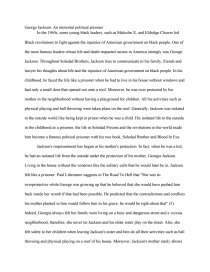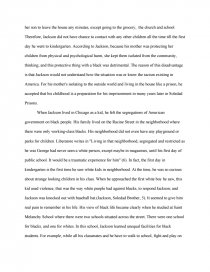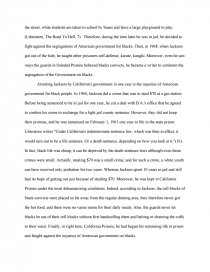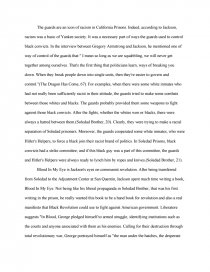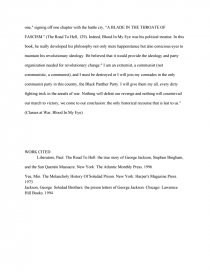George Jackson: An Immortal Political Prisoner
Essay by people • September 11, 2011 • Essay • 1,652 Words (7 Pages) • 1,860 Views
Essay Preview: George Jackson: An Immortal Political Prisoner
George Jackson: An immortal political prisoner
In the 1960s, some young black leaders, such as Malcolm X, and Eldridge Cleaver led Black revolutions to fight against the injustice of American government on black people. One of the most famous leaders whose life and death impacted racism in America strongly was George Jackson. Throughout Soledad Brothers, Jackson tries to communicate to his family, friends and lawyer his thoughts about life and the injustice of American government on black people. In his childhood, he faced the life like a prisoner when he had to live in his house without windows and had only a small door that opened out onto a roof. Moreover, he was over protected by his mother in the neighborhood without having a playground for children. All his activities such as physical playing and ball throwing were taken place on the roof. Generally, Jackson was isolated to the outside world like being kept in prison when he was a child. His isolated life to the outside in the childhood as a prisoner, the life in Soledad Prisons and the revolutions in the world made him become a famous political prisoner with his two book, Soledad Brother and Blood In Eye.
Jackson's imprisonment has begun at his mother's protection. In fact, when he was a kid, he had an isolated life from the outside under the protection of his mother, Georgia Jackson. Living in the house without the windows like the solitary cells that he would later be in, Jackson felt like a prisoner. Paul Liberatore suggests in The Road To Hell that "She was so overprotective while George was growing up that he believed that she would have pushed him back inside her womb if that had been possible. He predicted that the contradictions and conflicts his mother planted in him would follow him to his grave; he would be right about that" (5). Indeed, Georgia always felt her family were living on a busy and dangerous street and a vicious neighborhood; therefore, she never let Jackson and his older sister play on the street. Also, she felt safety to her children when leaving Jackson's sister and him do all their activities such as ball throwing and physical playing on a roof of his house. Moreover, Jackson's mother rarely allows her son to leave the house any minutes, except going to the grocery, the church and school. Therefore, Jackson did not have chance to contact with any other children all the time till the first day he went to kindergarten. According to Jackson, because his mother was protecting her children from physical and psychological harm, she kept them isolated from the community, thinking; and this protective thing with a black was detrimental. The reason of this disadvantage is that Jackson would not understand how the situation was or know the racism existing in America. For his mother's isolating to the outside world and living in the house like a prison, he accepted that his childhood is a preparation for his imprisonment in many years later in Soledad Prisons.
When Jackson lived in Chicago as a kid, he felt the segregations of American government on black people. His family lived on the Racine Street in the neighborhood where there were only working-class blacks. His neighborhood did not even have any playground or parks for children. Liberatore writes in "Living in that neighborhood, segregated and restricted as he was George had never seen a white person, except maybe in magazines, until his first day of public school. It would be a traumatic experience for him" (6). In fact, the first day in kindergarten is the first time he saw white kids in neighborhood. At the time, he was so curious about strange looking children in his class. When he approached the first white boy he saw, this kid used violence, that was the way white people had against blacks, to respond Jackson; and Jackson was knocked out with baseball bat.(Jackson, Soledad Brother, 5). It seemed to give him real pain to remember in his life. His view of black life became clearly when he studied at Saint Melanchy School where there were two schools situated across the street. There were one school for blacks, and one for whites. In this school, Jackson learned unequal facilities for black students. For example, while all his classmates and he have to walk to school, fight and play on the street, white students are taken to school by buses and have a large playground to play. (Liberatore, The Road To Hell, 7). Therefore, during the time later he was in jail, he decided to fight against the segregations of American government for blacks. Then, in 1968, when Jackson got out of the hole, he taught other prisoners self-defense, karate, kungfu. Moreover, even he saw ways the guards in Soledad Prisons behaved blacks convicts, he became a writer to condemn the segregation of the Government on blacks.
Arresting Jackson by California's government in one year is the injustice of American government for black people. In 1960, Jackson did a crime that was to steal $70 at
...
...
